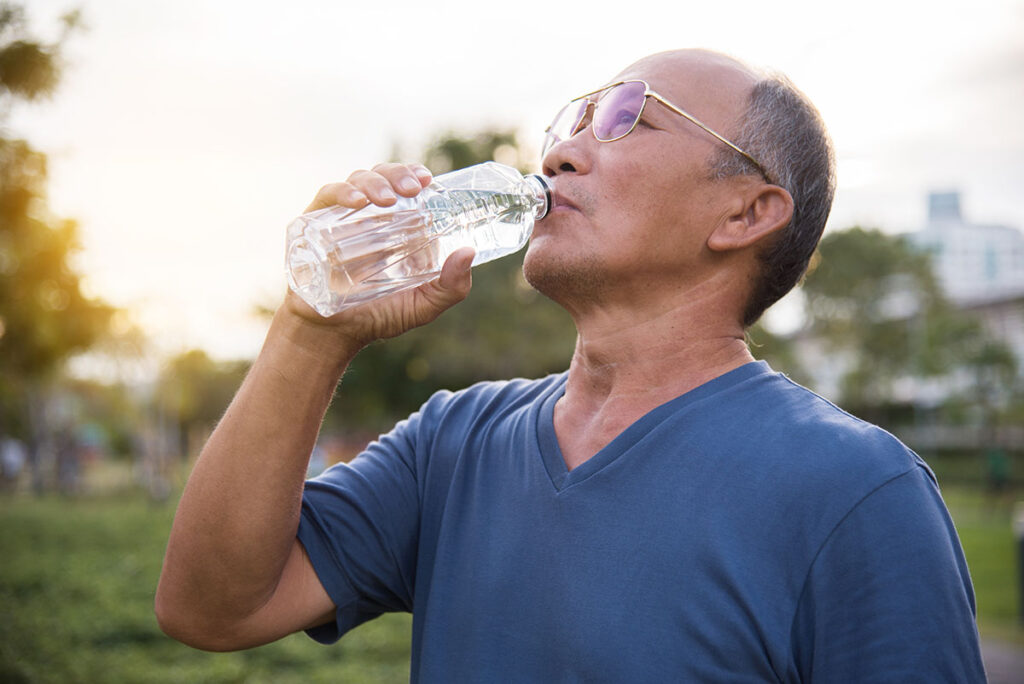Staying hydrated might seem like a simple health habit—but for older adults, it’s far more serious than many people realize. As we age, our sense of thirst decreases, and our bodies hold less water, making it easier to become dehydrated without even noticing. In assisted living communities like The Arbors and The Ivy, we take dehydration seriously because we know how quickly it can escalate into a major health issue.
Understanding the risks, symptoms, and prevention strategies surrounding dehydration in seniors is key to protecting health, independence, and quality of life.
Why Seniors Are More at Risk for Dehydration
Older adults are more susceptible to dehydration for several reasons:
- Reduced sense of thirst – Many seniors don’t feel thirsty even when their body needs fluids.
- Medications – Diuretics, laxatives, and certain blood pressure medications can increase fluid loss.
- Mobility issues – Difficulty accessing water or going to the restroom can discourage adequate intake.
- Underlying health conditions – Chronic illnesses like kidney disease or diabetes increase risk.
Dehydration can come on quickly and may go unnoticed until it causes more serious complications. That’s why early recognition and daily hydration are so important.
Common Signs of Dehydration in Seniors
Identifying signs of dehydration in seniors isn’t always straightforward. Symptoms can be subtle and are often mistaken for normal aging or other conditions.
Watch for:
- Dry mouth or cracked lips
- Fatigue or sleepiness
- Dizziness or lightheadedness
- Headaches
- Dark-colored urine or infrequent urination
- Muscle cramps
- Sunken eyes
- Confusion or irritability
One of the most concerning symptoms is confusion caused by dehydration, which can resemble the early stages of dementia or a sudden cognitive decline. At The Arbors and The Ivy, our trained staff monitor for these signs and quickly intervene when changes in behavior or alertness are noticed.
The Health Risks of Dehydration
Untreated dehydration in seniors can lead to serious complications, including:
- Urinary tract infections
- Kidney stones or kidney failure
- Low blood pressure and increased risk of falls
- Heat-related illnesses like heat stroke
- Hospitalization due to severe electrolyte imbalance
In some cases, dehydration can worsen existing medical conditions or interfere with the body’s ability to process medications properly. This risk should never be underestimated.
Preventing Dehydration in Seniors
Fortunately, preventing dehydration in seniors doesn’t have to be complicated. A few small changes can go a long way toward maintaining healthy hydration levels:
- Offer water regularly throughout the day, not just with meals.
- Incorporate hydrating foods like fruits, soups, and smoothies.
- Make water easily accessible in all living areas.
- Use reminders or prompts for seniors with memory loss or cognitive challenges.
- Provide alternatives to plain water, like herbal teas or flavored water, for a variety.
In our communities, hydration is integrated into daily routines—from hydration stations and regular reminders to encouraging fluid-rich snacks during social activities.
How The Arbors and The Ivy Support Hydration
At The Arbors and The Ivy, we know that proper hydration is one of the most overlooked but critical aspects of senior wellness. Our teams are trained to recognize early signs of dehydration, support daily intake through meal planning and activity-based reminders, and encourage residents to drink fluids according to their personal routines.
Because we’re family-owned and operated, our approach is personal and attentive. From restaurant-style dining and social gatherings to personalized wellness monitoring, we take the time to get to know each resident’s needs—and that includes making hydration part of every day in a natural, enjoyable way.
Stay Hydrated. Stay Healthy. Stay Connected.
If you’re concerned about your loved one’s health or noticing signs of dehydration, we’re here to help. At The Arbors and The Ivy, we offer more than just assisted living—we provide compassionate care, daily wellness support, and a vibrant community that helps residents thrive.
Contact us today at 860.698.8613 or online to schedule a visit or learn more about how our communities across Massachusetts and Connecticut can support your family. Let’s take care of the little things—like hydration—so you can focus on enjoying more meaningful moments together.

